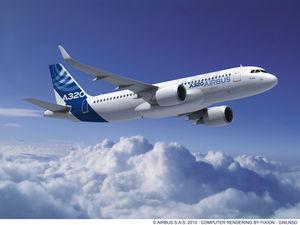 After securing another 100 orders for its highly efficient A320neo – bringing sales to well over 400 – Airbus is due to achieve its goal of 500 sales by the end of this week’s Paris Air Show.
After securing another 100 orders for its highly efficient A320neo – bringing sales to well over 400 – Airbus is due to achieve its goal of 500 sales by the end of this week’s Paris Air Show.
Compared to the standard A320, the recently announced A320neo “engine option” (also to be available on the A319 and A321) gives customers a choice between two engines that reduce fuel consumption by 15 percent (see PDF), or 370,000 gallons per plane per year. As a result, Airbus states the new engines reduce cash operating costs by 8 percent, reduce each plane’s carbon emissions by 3,600 tons per year, and will either improve payload by two metric tons or increase range by 500 nautical miles. For Airbus customers like Virgin America, the new A320neo “provides benefits of a new aircraft” without the costs associated with operating a different type of plane and cockpit.
According to the Wall Street Journal, the success of the A320neo will put pressure on Boeing to offer a fuel-efficient version of its competing model family, the 737. However, Boeing’s President and Chief Executive, Jim Albaugh, said that the A320neo just narrows the gap, as the 737 is still 2 percent more efficient. Airbus claims the A320neo achieves “16 percent less fuel burn per seat compared to Boeing’s winglet-equipped 737-800.” Numbers aside, industry analysts predict Boeing will have to react if Airbus wins over any major customers.
As fuel now represents the largest single operational cost to airlines (growing from 15 to 35 percent in the last decade), increasing competitiveness on fuel efficiency may offer some relief to airlines grappling with volatile fuel prices. But, since the A320neo won’t be in fleets until 2015, don’t expect airline fees to go away anytime soon.
Image

